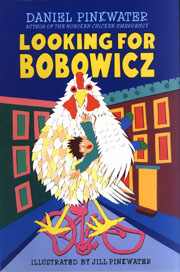Author and radio commentator Daniel Pinkwater didn’t grow up in Hoboken, but has spent many afternoons in his own idiosyncratic imagination pretending that he did. His latest children’s book, Looking for Bobowicz (HarperCollins, ages 8-12), follows the adventures of young Nick Itch, who moves to Hoboken from suburbs during the hottest heat wave in 120 years.
Nick Itch, along with new friends Bruno Ugg and Loretta Fischetti, sets out on a series of adventures, including a search for Arthur Bobowicz and his 266-pound chicken Henrietta – the hen that was immortalized in Pinkwater’s 1977 classic The Hoboken Chicken Emergency.
To date, Pinkwater has published over 80 books, mostly for children, and continues to write several new books every year. He is a regular contributor to National Public Radio’s “Weekend Edition Sunday” and “All Things Considered” and is known for books such as The Snarkout Boys and the Avocado of Death and Jolly Roger: A Dog of Hoboken.
Pinkwater lived in Hoboken for around 12 years starting in 1965. He said during a telephone interview on Tuesday that he often wondered what it would have been like to grow up in such a diverse and friendly urban community as Hoboken.
“It’s a charming place in a gritty way,” he said. “I really loved my time there.”
Pinkwater, and his wife Jill, who illustrated the book, now live in Hyde Park, New York.
Here’s the story
The story follows Nick, who, at first, is skeptical of his new Hoboken home. He complains that the 120-year-old house is in “rotten condition” and cost three times as much as their modern house in the suburbs.
Obviously, there’s truth in Pinkwater’s fiction.
Nick goes on to lament: “This is what an urban lifestyle is: My bike was stolen in the first hour we were in town. And it was 100 degrees Fahrenheit. My mother didn’t want me growing up in the suburbs. She said life was real in cities.”
But as the story unfolds, Nick meets new friends Bruno and Loretta, and they find cool stuff in his basement like hundreds of Classic Comics. They also listen to Hoboken pirate radio.
The trio decides, in a fit of curiosity, to go out into Hoboken’s streets to find the legendary 266-pound chicken, and along the way hope to discover who filched Nick’s bicycle. As their escapades unfold, they participate in the Hoboken’s annual Bat Hat Festival, and meet vibrant Hoboken residents such as scatterbrained librarian Starr Lackawanna and Meehan the Bum.
“My book is about the treasures of urban life,” said Pinkwater, “about afternoon adventures on hot summer days discovering all of these little nuggets.”
The real and the quirky
Throughout the story, Pinkwater weaves real places and real details with the imaginary. For instance, there are some real Hoboken locations, like Sybil’s Cave – a place in the outcropping of rocks on Sinatra Drive that was immortalized in Edgar Alan Poe’s works. Visitors to Hoboken once paid a penny for natural spring water there, supposedly with medical value. The cave was filled in in the late 1930s.
There is also a passing mention of Guglielmo Marconi, who invented the radio and who lived in Hoboken. But Pinkwater intermixes the fanciful with the factual. As if a 266-pound chicken wasn’t enough fantasy, there are little added touches, such as the Hoboken Bat Hat Festival, where neighbors attempt to catch bats with their hats as they pass under the streetlights at night.
“I like to mix it up,” said Pinkwater. “When I write about Hoboken, I mix real detail with the completely imaginary. It isn’t important to be accurate, because Hoboken is a state of mind.”
Imaging growing up in Hoboken
Pinkwater moved to Hoboken in 1965, after his art supplier said that he knew of a loft apartment on Hudson Place.
“In those days, I was trying to be an artist,” said Pinkwater. At the time, Hoboken was becoming a burgeoning enclave for rising artists looking for spacious and cheap lofts.
Pinkwater said that to this day, he still remembers his first night at the second floor apartment.
“What I wasn’t told [about the apartment],” said Pinkwater, “was that there was a saloon [below my loft], and that saloon was home to a horrible live band, a horrible loud live band.”
But, he said, he got used to the noise and quickly gained a deep appreciation for the mile-square city.
“There was such a wonderful community,” he said, “full of colorful and interesting people.”
He reminisced about eating “some of the world’s best” hot dogs by the Erie Lackawanna Ferry Terminal and riding the steam-powered ferries for only a quarter. And, of course, he remembers the view from the waterfront. He added that during his time here, he was attracted to Hoboken’s human scale, the fact that there “was a sense of extended family” in this place that is so close in proximity to Manhattan.
“It’s a real place all by itself next the big city,” said Pinkwater. “It’s a real place with real traditions.”
The city’s human scale mixed with an urban environment, he said, is one of the reasons that Pinkwater has been drawn to setting his stories in Hoboken.
“I get a certain feeling from the town,” he said. “The way the sunlight hits the bricks [of the brownstones], the way the lights of Manhattan shine across the river, and the sense that the water is never far away.”
He added that he knows how long it takes to walk a block, and what it sounds like as one passes the city’s stoops, all of which aid in his creation of place and cadence when he writes a story based in Hoboken.
